Who first comes to mind when you think of a wealthy, narcissistic, arrogant womanizer who thinks he is above the law and breaks the rules without concern for the impact of his actions? Who repeatedly insults, intimidates, dodges and constantly attempts to outwit those who surround him? Who thrives on sewing chaos? It's Don... Juan, of course.
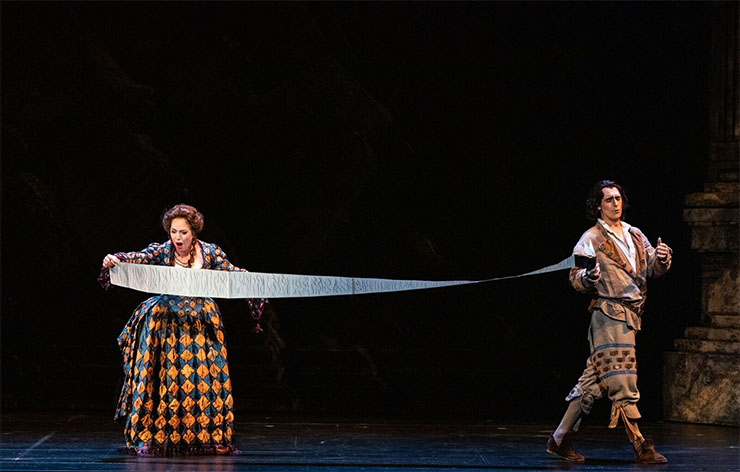
Photo credit: Daniel Azoulay
Don Juan, known in Italian as Don Giovanni, has become the brand for any licentious libertine since the prototype Don Juan drama "El burlador de Sevilla" was created by Spanish writer Tirso de Molina in the early 17th century. Don Juan has been the subject of several operas, plays and poems, "Don Giovanni" by Wolfgang Amadeus Mozart and librettist Lorenzo Da Ponte considered to be the most luminary account of the fictional baddest of boys.
And with the #metoo movement in swing, Mozart's masterwork made for a timely opener on Saturday, Nov. 16, at the Adrienne Arsht Center for Florida Grand Opera's 79th season.
The level of sophistication of Mozart's work remains remarkable. Though opera started ramping up at the turn of the 17th century, Mozart lifted it out of its Baroque underpinnings and arguably launched the Golden Age of Opera. His was a singular modern sound loaded with engaging melody, advanced harmonies and lush orchestrations, an entirely new sound for the ears of late 18th century audiences, setting a new high bar for operatic composers to leap over for the next 150 years.
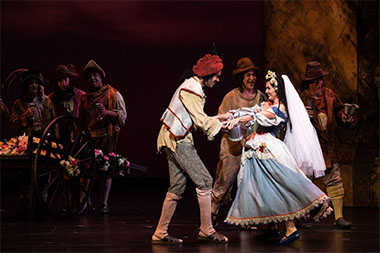
Photo credit: Daniel Azoulay
Extraordinary was how superbly Mozart blended storytelling, character and music, into an unblemished whole cloth, unifying all theatrical forces together rather than just sailing arias over the center field fence. He called "Don Giovanni" an opera buffa, blending comedy, melodrama and supernatural elements. Da Ponte referred to it as a "dramma giocoso" (drama with jokes).
Playing the quintessential reprobate, Grammy Award-winning baritone Elliot Madore was a fine choice as Don Giovanni. The devilishly good looking man with a long dark curled ponytail, opulent finery and knee-high boots, cuts a fine figure on stage, essaying his arias and duets with his considerable baritone, adjusting at will the color in his voice to convincingly deliver sensuality, confidence, deceit and rage.
He revealed the lively and suppleness of his vocal chops rendering the "Champagne Aria" ("Fin ch'han dal vino calda la testa"), ordering up a big party with a pleth of ladies, and with "Deh, vieni alla finestra," coaxing Elvira's maid to the window. Persuasively playing seduction and sincerity at the same time is no easy task for any actor, Madore effectively imbued his character with both qualities during the seduction of Zerlina in the familiar duet, "Là ci darem la mano," enhancing his hypermasculine character with his velvety smooth pipes.
Leporello, Giovanni's majordomo and sidekick, was well drawn by bass-baritone Federico De Michelis, credibly portraying the frustrations with and love for his master, maintaining a sense for self-preservation with good comic timing, resisting an over-the-top performance which could easily come to this character.
His round bass-baritone served him well on his arias – dreaming of being free from the demands of his boss in the recognizable "Notte e giorno faticar" and with the amusing "Catalogue Aria" ("Madamina, il catalogo è questo") where he explained to Donna Elvira how Giovanni is unfaithful to everyone, unraveling an eight-foot roll of paper from a little red book which catalogued Giovanni's conquests, adding up to 2,065 different women and girls from Italy, Germany, France, Turkey and Spain.
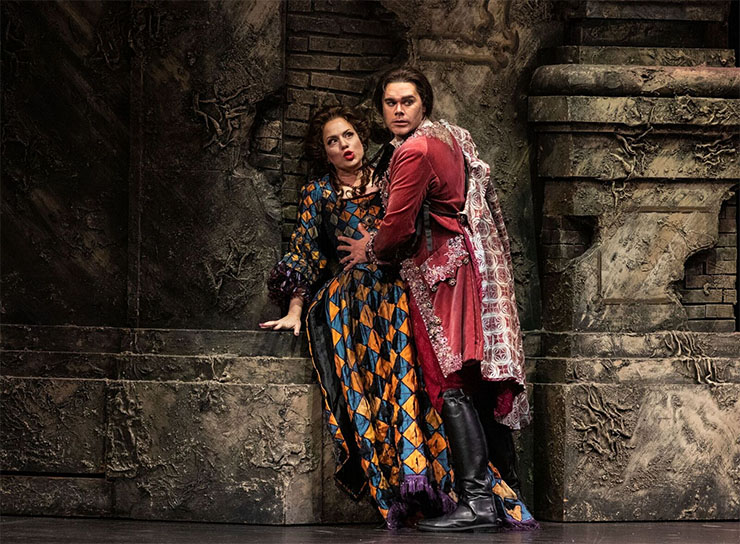
Photo credit: Daniel Azoulay
There was Simpatico between Michelis and Madore, their banter landing well, their voices a good match. Michelis had the laugh line of the evening when Leporello complained that he is "sick and tired of hearing Mozart's aria everywhere all the time," a musical quote from "Non più andrai" from Mozart's own "The Marriage of Figaro" playing as part of Giovanni's ‘popular' musical entertainment during the final feast.
Having three outstanding sopranos share the stage is always a treat and this opening night audience at the Arsht was treated.
Soprano Elizabeth Caballero, playing Giovanni's jilted lover Donna Elvira, possessed a powerful voice, strong at both the bottom and the top of her register, her vocal agility on full display while declaiming the abandonment by her lover and wishing for imminent revenge ("Ah, chi mi dice mai"). She traversed the complicated emotions of loving and loathing someone at the same time with "Mi tradì quell'alma ingrata," fluidly moving from anguish within to outward strength, claiming that "the heart demands vengeance but also beats with love." Extraordinary was the nimbleness she voiced with her long runs.
As an actor, Caballero was solid, going toe-to-toe in her scenes with Madore, especially in her last desperate pitch for Giovanni to change his ways ("L'ultima prova dell'amor mio"), the fierceness in her plea palpable, Madore trading licks and matching her emotion with his scorn ("sostegno e gloria d'umanità"), praising wine and women as the "support and glory of humankind."
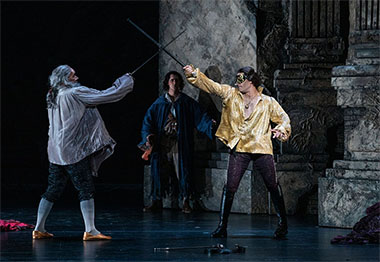
Photo credit: Daniel Azoulay
Donna Anna was played by the lovely soprano Elizabeth de Trejo, effectively expressing emotion, anger and determination by approaching her lyrics softly and amplifying them with strength in her aria "Or sai chi l'onore Rapire a me volse," imploring her fiancé Don Ottavio to avenge her honor. She navigated the heavenly aria "Non mi dir," assuring Ottavio of her love, with nuance and sincerity, sweetness and love ringing true. Applying her substantial voice to the full range of her low notes and highs and expressing her challenging runs with exceptional ease, brought cheers from the audience.
Soprano Asleif Willmer captured the essence and naiveté of Zerlina, trying to pacify her jealous Masetto ("Batti, batti o bel Masetto"), prancing and flirting as she coquettishly handled the lovely lilting melody. Soothing her battered Masetto ("Vedrai carino"), Willmer won the affections of the audience with the aria, freely reaching her high notes, sweetly seductive, physically and vocally.
Playing Donna Anna's fiancé, Don Ottavio, competent tenor Nicholas Huff, convinced that Giovanni was the Commendatore's murderer, delivered the difficult aria "Il mio tesoro" with assurance, traversing well the tricky runs that required every bit of real estate from his vocal cords. Baritone Michael Miller played the bemused Masetto with the required angst and confusion for what was happening between Giovanni and his fiancée Zerlina. Sturdy basso Kevin Langan, playing the ominous Commendatore, dominated the stage during the final scene, a stoic, moral authority cutting an imposing figure, his exceptional voice and orchestra shaking the room ("Don Giovanni! A cenar teco m'invitasti"), giving Giovanni one last chance to repent.
Duets, trios and quartets were plenty and gorgeous; harmonies, patter and runs were well articulated, superbly blended by the cast, all worth the price of admission.
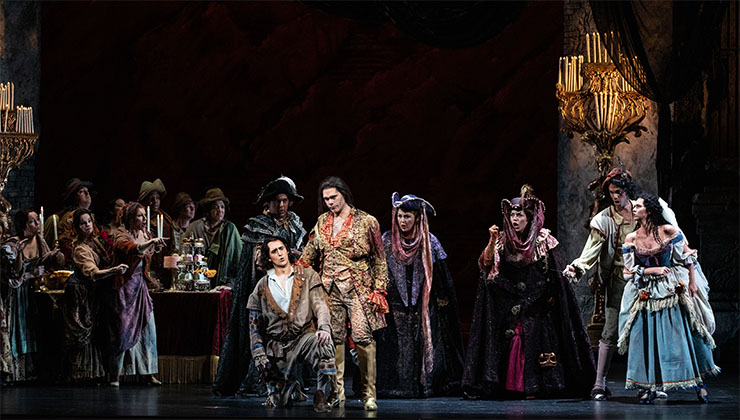
Photo credit: Daniel Azoulay
Stage director Mo Zhou framed the opera with a shrewd eye, especially abandoning cliché for tenderness in staging the couples scenes – encouraging a soft hand to the cheek, a playful gesture, a cheeky smile. She mined the relationship between Giovanni and Leporello, bringing out the subtleties in their personalities to deepen and widen their bond. Zhou made a bold choice in eliminating the finale, where the main players explained "where to from here" after Giovanni is swept away by the demons, a cut Mozart himself made after the 1787 premier in Prague, though most opera houses have included the finale over the past century.
Shouts of "bravo" from the standing crowd closed out the evening.
John Pascoe's utility set included crumbling stone columns and walls on either side with a backdrop that was lit to create a variety of moods. A scrim was dropped and lifted to create smaller spaces. Nifty lighting by Nate Wheatley bathed Madore in a pool of light while serenading Elvira's maid, a pale orange glow appearing in the balcony, suggesting the maid was approaching the window. A rising scrim revealing light flickering red and orange effectively created the atmosphere for the demons to take the stage and drag Giovanni off to hell, the bad boy no longer able to outfox those who filled his world. Besides knee high boots, capes and a variety of colorful outfits for the men, Ann Hould-Ward's costumes included fashionable dresses in pinks, blues, indigo and red for the ladies.
Maestro Christopher Allen ardently helmed the FGO Orchestra, bringing to life Mozart's plush score, from the overture's iconic booming D minor cadence leading into the delightful D major allegro, to the complex harmonic motifs and rhythmic transitions that underscored every ounce of action on the stage. Reliable chorus master Katherine Kozak prepped the fine ensemble of peasants, servants, young ladies, musicians and demons.
This is a big opera, with big music and big characters. FGO's production team and guest artists deserve praise for pulling together all the moving parts to create what audiences now in South Florida can enjoy and no doubt in Mozart's time relished.
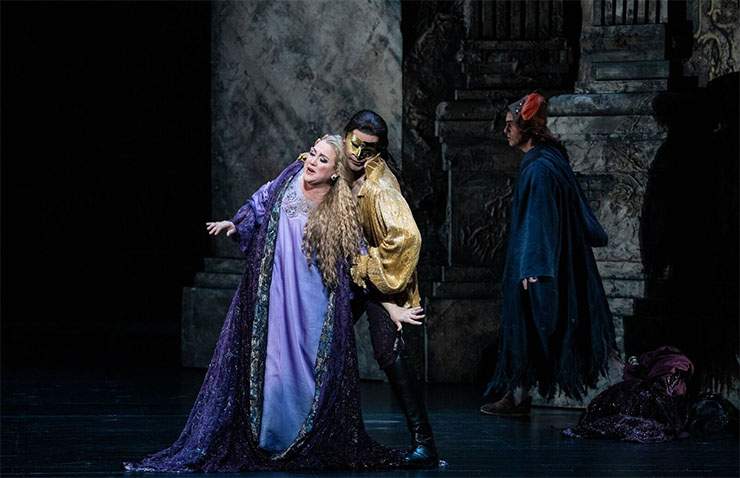
Photo credit: Daniel Azoulay
Someone once said that Washington, D.C., is just Grand Opera in search of a score. Perhaps a composer with Mozart's sense of wit and purpose will fashion such about say, a president who appears above the law, admits nothing, denies everything, foments chaos, enjoys a spin machine that offers up alternative realities and conducts a chorus of staff and citizens that support his questionable agenda. And about a group of people who collectively expose and topple the leader who thinks, like Giovanni, that he could escape any consequences for his actions. All the trappings begging a big score!
Don Giovanni
By Wolfgang Amadeus Mozart; libretto by Lorenzo Da Ponte; conductor, Christopher Allen; stage director, Mo Zhou; production, Michigan Opera Theatre/Florida Grand Opera; sets by John Pascoe; lighting by Nate Wheatley; costumes by Ann Hould-Ward; wig and make-up by Sue Schaefer; chorus master, Katherine Kozak; assistant conductor, Todd Craven; production stage manager, Kathleen Stakenas; FGO general director, Susan T. Danis; audio description by the Arsht Audio Description Volunteer Team.
Cast: Don Giovanni - Elliot Madore, Leporello - Federico De Michelis (Miami) / Rafael Porto (Fort Lauderdale), Donna Anna - Elizabeth de Trejo, Donna Elvira - Elizabeth Caballero, Don Ottavio - Nicholas Huff, Zerlina - Asleif Willmer, Masetto - Michael Miller, Commendatore (Don Pedro) - Kevin Langan
Remaining Schedule | Don Giovanni
Sung in Italian with projected titles in English and Spanish
Adrienne Arsht Center / Ziff Ballet Opera House, 1300 Biscayne Boulevard, Miami.
- Thursday, November 21, 2019 8 p.m.
- Sunday, November 24, 2019 2 p.m.
Fort Lauderdale - Broward Center for the Performing Arts / Au-Rene Theater, 201 S.W. 5th Ave. Fort Lauderdale.
- Thursday, December 5, 2019 7:30 p.m.
- Saturday, December 7, 2019 7:30 p.m.
Real time audio description is available without charge for blind and visually impaired patrons attending Arsht Center operas and Broadway shows.
FGO's Box Office is located at the Doral Center at 8390 NW 25th Street, Miami, FL 33122, and is open from 10 am to 4 pm, Monday through Friday during the season. Tickets may be purchased online at www.FGO.org or by phone at (800) 741- 1010.


